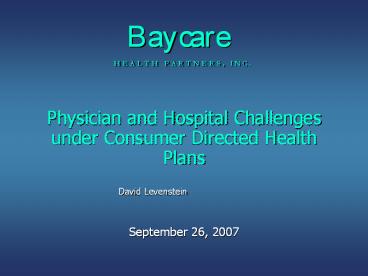Physician and Hospital Challenges under Consumer Directed Health Plans - PowerPoint PPT Presentation
Title:
Physician and Hospital Challenges under Consumer Directed Health Plans
Description:
High deductible: e.g., Aetna Health Fund, Tufts Liberty, others ... Primary Choice and Tufts Navigator become commercially available (tiered products) ... – PowerPoint PPT presentation
Number of Views:30
Avg rating:3.0/5.0
Title: Physician and Hospital Challenges under Consumer Directed Health Plans
1
Physician and Hospital Challenges under Consumer
Directed Health Plans
David Levenstein
- September 26, 2007
2
Agenda
- Baycare Health Partners Overview
- Consumer Directed Health Care
- High Deductible Health Plans
- Provider Tiering
- Physicians
- Hospitals
3
What is Baycare Health Partners?
- Formed in 1994, Baycare is a physician-hospital
organization (PHO) jointly owned by - Greater Springfield IPA and
- Baystate Health
- Baycare represents a three-hospital health
system and approximately 1,100 physicians - Messenger model PHO offers managed care contract
analysis and clinical integration programs that
use process and outcome clinical measures and
shared clinical information networks
4
Tsunami Consumerism in Health Care
Market Sensitivity to Provider Performance
Public Reporting Pay-for-Performance Cost
Shifting Provider Tiering
5
Environmental Assessment Market Forces in Play
- As health care costs increase,
- Payers (government, employers and MCOs) are
- Shifting more financial responsibility for
medical care to their beneficiaries, employees
and members - Designing insurance products that encourage the
patient, now consumer, to consider cost
differences when choosing among providers - Benefit designs vary, but they all share a common
purpose - Members will become better informed
(transparency) about and actively engaged
(consumerism) in the quality and cost of the
health care they receive - MCOs often refer to these new products as
Consumer-Directed/Driven Health Care (CDHC)
plans
6
Environmental Assessment Market Forces in Play
- Purchaser Premise Health care expenditures will
be lower and more rational by using market forces - Response
- Shift more of the costs for the health care
services to the patient with the presumption that
the patient will choose higher value
(quality/cost) healthcare providers - Transparency
- Public reporting of efficiency and quality
ratings of health care providers (hospitals,
nursing homes, physicians) - Pay for performance
- Incentivize the high quality efficient providers
- High deductible programs
- Lower premium/ high annual deductibles
- Tiered programs
- Differential copays deductibles based on
efficiency quality ratings of providers
7
Consumer Directed Health Care A Brief History
2004
2005
2003
- Consumer Directed Health Care (CDHC) plans arrive
in Western MA - High deductible e.g., Aetna Health Fund, Tufts
Liberty, others - High copay (rather than high deductible) HNE
- Baycare develops position paper on CDHC products
(approved by the Board in May) - HPHC Primary Choice and Tufts Navigator become
commercially available (tiered products) - Baycare sends Newsletter to membership
highlighting the emergence of and explaining CDHC
products - GIC requires each of the MCOs with which it
contracts to include a benefit design with tiered
member copayments for some hospital services - Baycare develops Principles for Tiered
Premium/Copayment Pay-for-Performance Programs - GIC requires each of the MCOs with which it
contracts to include tiered member copayments for
visits to at least some types of physicians - GIC continues to require MCOs to offer its
members tiered products most now tier both PCPs
and specialists, but using their own tiering
methodologies - Many MCOs offer, tiered, high deductible, and/or
narrow network products under the Commonwealth
of Massachusetts Commonwealth Choice Program
under the Connector Authority
2004
2005
2006
2007
8
Environmental Assessment Market Forces in Play
- Provider perspective
- All the conditions required for perfectly
competitive markets do not exist in health care,
making the health care market quite different
than markets for other goods and services - Supply limitations and geographic variation
- The purchasers (employers) of health care are one
step removed from the consumer (patients) and
providers - Price information is of little value by itself
- The current state of information is inadequate
- Patient use of information is not likely to
transform health care - Consumerism in health care may be the wrong
prescription, particularly for the - Financially strapped and chronically ill
9
Adults with High DeductiblesHave Problems Paying
Medical Billsor Are Paying Off Medical Debt
Percent of adults ages 1964 insured all year
with private insurance
Includes only those individuals who had a bill
sentto a collection agency when they were unable
to pay it. Source S.R. Collins, J.L. Kriss et
al., Squeezed Why Rising Exposure to Health Care
Costs Threatens the Health and Financial
Well-Being of American Families, The Commonwealth
Fund, Sept. 2006.
10
Provider Challenges
- Access to data
- Relationship between claims data and MCO bundling
logic - Lack of uniform tiering methodologies
- Lack of patient understanding of financial
obligations - Provider, not plan, necessarily informs patient
- Interferes with provider-patient relationship
- Bad debt and debt collection
11
Potential Legislative Responses
- MA and RI bills proposed in legislatures
- Requiring carriers to fully explain specific
patient financial obligations prior to receiving
care - Shifting some responsibility to carriers to
collect member payment obligations on behalf of
providers































